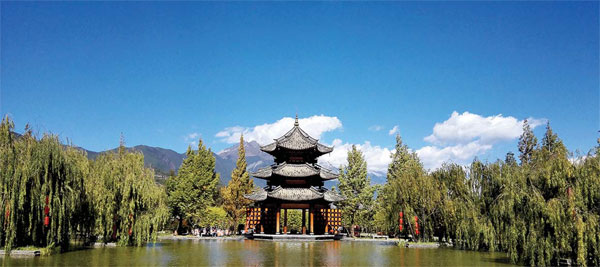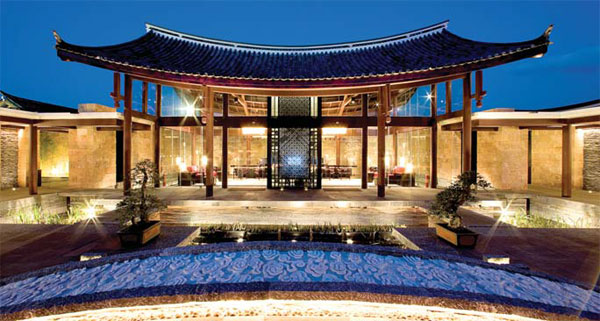Luxury to touch the heart
Banyan Tree Lijiang Resort offers guests a relaxing way to immerse themselves in nature and the local culture, Wang Xin reports from Lijiang, Yunnan.
Few visitors to Lijiang in Yunnan province would choose to miss a trip to Jade Dragon Snow Mountain, reportedly the second highest in the province, with its highest peak 5,596 meters high.
The 5A-level tourist destination, the top category for China's tourism industry, was said to be popular with many Romeos and Juliets from the Naxi people, a major ethnic group in Lijiang, as the Naxi people believed that lovers who were rejected by the conventions of a secular society and sought death on the mountain would go to heaven and enjoy eternal peace.
For today's couples climbing the wooden stairway up the side of the mountain, being with a partner means they each have someone who can offer encouragement and assistance as they toil upwards.
|
Banyan Tree Lijiang Resort in Yunnan province provides a view of Jade Dragon Snow Mountain. Wang Xin / China Daily |
|
The design of the hotel's buildings is inspired by local Naxi people's architectural style. Provided to China Daily |
For those wanting the romance without the effort, Banyan Tree Lijiang Resort offers a more relaxed way to experience the mountain's charms.
Many guests staying at the hotel villas said they can lie in the comfort of their bed and admire the "golden peaks", as the sun lights up the snow on the mountain top at about 7 am. The mountain has 13 major peaks altogether.
At night, immersing yourself in the 38 C water of a hot spring pool in the courtyard under the starry sky is sheer bliss, especially for those escaping from smog-blanketed, bustling cities.
"As one guest told me, the hotel is a place where the soul can rest," said Claire Chiang, chairperson of China Business Development at Banyan Tree Holdings Ltd. "Here, you can enjoy the privacy we all value and sense time still, so you can let your mind drift away from any cares and troubles."
"That's the luxury that we provide - the integration of the nature in the design of the hotel, the facilities we provide, and the care represented by our services can really touch the heart," she said.
The picturesque hotel features rows of villas in the traditional Naxi architecture style, with small streams running in front of them and a variety of flora dotted around.
The villas also have an appealing Eastern aesthetic. For instance, the villa where I stayed was surrounded with bamboo, which symbolized noble-hearted people in ancient China.
In the washroom, between two mirrors is a glass wall above the washstand, which reflects the bamboo forest outside amid the aroma of essential oil.

The shadows of the bamboo also fall on the curtain made from a material like the paper used for painting in the study where oolong, green tea, red tea and rose tea are available, adding to the tranquil ambience.
Despite the hotel's many attractions, Chiang is keen for guests to experience the hotel within its setting. She said the hotel plans to launch a variety of six- to eight-hour local experiences next year, so guests can immerse themselves in the beauty of the landscape and the local Naxi culture.
"For instance, we will organize a morning jog to the fields to appreciate the mountain at sunrise, and have a picnic breakfast before setting out for the ancient towns nearby, climbing the snow-capped mountain, visiting local residents or bringing guests to Banyan starred restaurants," she said.
"Health, well-being, food and nature are all part of a high-quality life. We will take all these into consideration when formulating experiences," she said.
Lijiang, where ethnic groups account for more than half of the total population, was a key hub on the ancient Tea Horse Road linking Yunnan and Tibet. Chiang said she is considering developing new travel experiences for guests along the ancient trade route.
"Immersing themselves in the local culture and natural surroundings bring our guests another perception of and affection for the destination, which will motivate them to become regular visitors," she explained.
She drew my attention to the representation of the Banyan tree that forms the group's logo, saying "the tree is deeply rooted in our corporate culture, and its branches spread into the local communities we serve".
The 65-year-old from Singapore said when she and her husband began to create their own hospitality brand logo in the 1960s, her eyes naturally turned to trees.
"Trees are Earth's endless effort to speak to the listening heaven", she said, quoting from a poem by the Indian poet Rabindranath Tagore (1861-1941) to paint a poetic image of the company's growth.
Contact the writer at wangxin@chinadaily.com.cn
(China Daily 11/26/2016 page10)
















